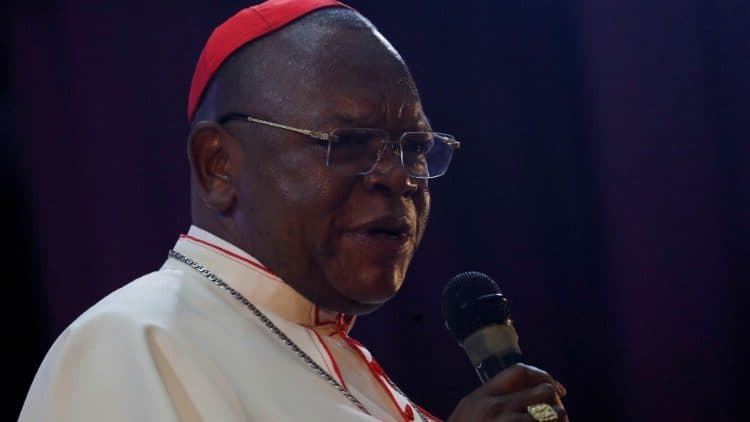YAOUNDÉ, Cameroon – Amid what threatened to become a serious church/state situation in Africa’s largest Catholic country, a cardinal threatened with prosecution for sedition in the Democratic Republic of Congo met May 16 with the country’s president and afterward attributed the tensions to “misunderstandings.”
“There has been more misunderstanding than a real problem,” said Cardinal Fridolin Ambongo of Kinshasa after his encounter with President Félix Tshisekedi at Congo’s Presidential Palace, where the chargé d’affaires of the Vatican embassy in Congo, Monsignor Andriy Yevchuk, was also present.
Ambongo said the meeting, which lasted two hours, was devoted to discussing issues “that may have created unease.”
Though Ambongo did not indicate whether the recent threat of prosecution has been withdrawn, he attempted to present the results of the meeting in a positive light.
“Where people dialogue, things are clear,” he said. “It is with a feeling of great satisfaction and gratitude towards the head of state that I leave this office. As far as I’m concerned, normally there are no more problems. There have been more misunderstandings than real problems.”
Ambongo also insisted that he and Tshisekedi, whose great-uncle was a Catholic bishop in Congo but who today attends a Pentecostal mega-church, share a concern for the common good.
“I think we agree on one point,” Ambongo said. “As head of state, his concern is the good of the Congolese people. He is committed body and soul to ensuring that this country regains its serenity and respectability on the international stage. This is a battle he is waging. On our part as a Church, our concern is also the good of [the Congolese people].”
In that context, Ambongo said, church and state in Congo “are condemned to work together, hand in hand, for the good of our people, for the good of our country, which today is in peril because of the voracity of neighboring countries.”
That’s a more conciliatory tone than might have been expected given recent government moves.
In late April, a public prosecutor of Congo’s supreme court, Firmin Mvonde Mambu, ordered the opening of a judicial investigation into Ambongo, accusing him of encouraging people to revolt against established institutions.
In an April 27 letter, Mambu claimed that Ambongo’s rhetoric was tantamount to “seditious statements… likely to discourage soldiers of the armed forces of the republic who are fighting on the front lines, but also inciting rebels and other invaders of the local populations already bruised by years of destabilization.”
“He seems to be deliberately violating people’s consciences and taking pleasure in spreading these false rumors and other incitements to revolt against the established institutions and to attacks on human lives,” the letter said.
Observers say the charges reflect the fact that Ambongo had emerged as a prominent critic of the government’s handling of ongoing violence in the eastern part of Congo, as well as charges of pervasive corruption and ongoing complaints about the fairness and legitimacy of Congolese elections.
Church leaders across Africa denounced the threat of criminal action against Ambongo, styling it as an effort to muzzle the Church’s voice.
Johan Viljoen, the Director of the Denis Hurley Peace Institute of the Southern Africa Bishops’ Conference told Crux that no one should ever be harassed or punished for speaking out their minds.
“Nobody should be persecuted for speaking the truth to power,” he said.
“It is the prophetic ministry of the Church to speak out against injustice, corruption, oppression and sin. The truth shall set us free. That is why the Church should always maintain a critical distance from the state. The Church’s loyalty is towards the Kingdom of God, not towards a corrupt, repressive, man-made polity,” he told Crux.
Father Godefroid Mombula Alekiabo, academic secretary of Saint Augustine University in Kinshasa, said part of the vehemence of the government’s reaction may have to do with the fact that historically, the Catholic Church generally has been a reliable supporter of whoever was in power in the country.
“Formerly a reliable ally, [the Church] has increasingly become the state’s most severe institutional critic,” Alekiabo told Crux.
Like other Catholic leaders past and present. Ambongo frequently has called attention to the long-running crisis in eastern Congo.
For over 30 years eastern Congo has been marred by conflict, where over 100 armed groups and foreign armies battle for the control of the region’s vast mineral deposits.
The toll is staggering, with approximately six million people killed since conflict re-escalated in 1996. Some 6.1 million others have been displaced internally, and nearly a million Congolese have gone out of the country to countries such as Angola, Burundi, the Republic of the Congo, Uganda, the United Republic of Tanzania, and Zambia.as refugees or asylum-seekers.














